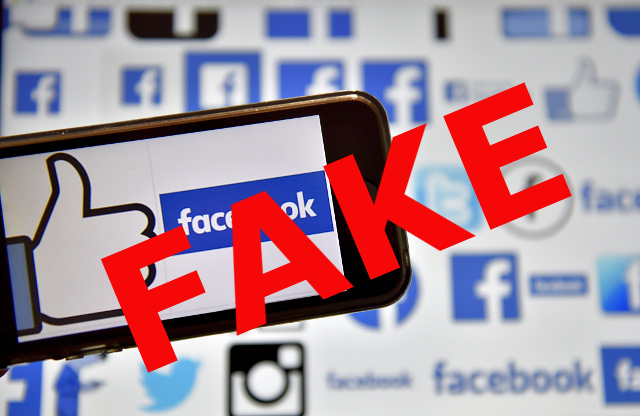A group of 37 French and international media outlets, supported by Google, on Tuesday launched “CrossCheck“, a joint fact-checking platform aimed at detecting fake information which could affect the French presidential election.
Fears that fake news stories posted on social media sites could influence the French election grew in the aftermath of Donald Trump’s shock election win in the United States in November.
Amid the blame game and soul-searching that followed Trump’s victory over Hillary Clinton many pointed the figure at the proliferation of fake news and phoney stories that spread like a nasty virus on social media.
Clinton herself even called fake news an “epidemic”.
Even though a study later debunked the idea that fake news was responsible for Trump’s win, in France they are taking no chances.
“We need to give voters all the cards in their hand so they don’t vote on the basis of false rumours,” Clémence Lemaistre from French newspaper Les Echos, one of the partners in CrossCheck told The Local.
“It’s important for democracy. We don’t want people to vote on the basis of something they happened to read on Facebook,” she added.
While Lemaistre and those behind CrossCheck, including Agence France-Presse and French dailies Le Monde and Liberation, doubt that fake news could decide the outcome of the presidential election in which some 37 million French voters are expected to cast a ballot, they believe it could have an influence.
First Draft's Jenni Sargent, who is in charge of the project said: “There will be efforts to deliberately cause chaos and we have a responsibility to find those [fake news stories] if we can.”
And Derek Thomson who runs the France24 Observers, another participating media added: “We know already there are people in the US, supporters of Donald Trump, who want to influence the French election.”
In recent weeks there has been much focus on alleged interference from Moscow in an attempt to discredit the pro-Europe candidate Emmanuel Macron in favour of either Marine Le Pen or François Fillon, both open admirers of Vladimir Putin.
Macron’s team publicly accused Russian state media sites Sputnik and Russia Today of pushing out fake news stories suggesting Macron, who is married to his former teacher, was having a homosexual affair with the boss of France Radio Mathieu Gallet.
READ ALSO: EIGHT of the most ridiculous 'fake news' stories about France

“We are in the presence of an orchestrated attempt to destabilize a candidate in the presidential election by a foreign power,” said Richard Ferrand, secretary-general of Macron's En Marche! (On The Move) movement.
The accusation prompted Russian news sites to strongly deny accusations of meddling in the election using fake news and even the Kremlin itself also issued a similar robust denial that it would “interfere in the electoral process” in France.
Nevertheless experts on Russia suggest it’s likely that Moscow will try to do whatever it can to obtain a favourable result in the French election.
Hélène Blanc, a Russia specialist and author of Goodbye Putin told Le Parisien: “If Macron is not to Vladimir Putin's liking, if he does not think that this candidate will support his policies, his ambitions, his strategy, then Putin will do whatever it takes to weaken him.”
When asked whether CrossCheck could end up simply as an “anti-Russian operation” that ends up favouring Emmanuel Macron, France 24’s Derek Thomson said: “If a fake news story comes from a Russian source, it’s not our fault. They started it.”
Perhaps knowing CrossCheck was about to be launched, the Russian Foreign Ministry has begun stamping big red “Fake” labels on US and British media articles it considers phoney.

Unlike Russia's version, which appears to be run by the Kremlin alone, CrossCheck asks members of the public to flag up stories, anonymously if they wish, that they believe might not be genuine or perhaps just a crucial paragraph or false claim.
The CrossCheck website then allows the 37 media partners to pool their efforts to expose false political and other claims and establish the facts to either stand up or debunk the story.
The website is live and has already debunked a story shared on Facebook 35,000 times about a priest being attacked, as well as one from Buzzfeed about Emmanuel Macron planning to charge homeowners “rent”.
There is also a debunking of a fake tweet claiming to be from far-right leader Marine Le Pen (see below) that suggested she was shocked by a cartoon character wearing the Islamic headscarf.
The debunking may help dispel suggestions by Russia Today for example, that CrossCheck is run mainly by left-wing media sites that are biased in favour of left-wing candidates.

But how effective can a website that aims to debunk or indeed confirm the validity of news stories be against stories that have already garnered thousands of shares on social media sites?
Even the creators of CrossCheck admit that those sharing fake news around are unlikely to have their opinions changed by the work their journalists do.
On top of that, French media partners can, but are not obliged to publish articles about the stories that have been confirmed as fake news, so the question remains: will anyone even notice when damaging fake news stories have been debunked?
For those involved the main issue is simply to do their job.
“When people talk about fake news we avoid talking about the programmes of the candidates,” Le Monde journalist Adrien Sénécat told The Local.
“We want the debate around the presidential election to be based on real subjects. That's a problem,” he added.
The online battle has begun in earnest.


 Please whitelist us to continue reading.
Please whitelist us to continue reading.
Member comments